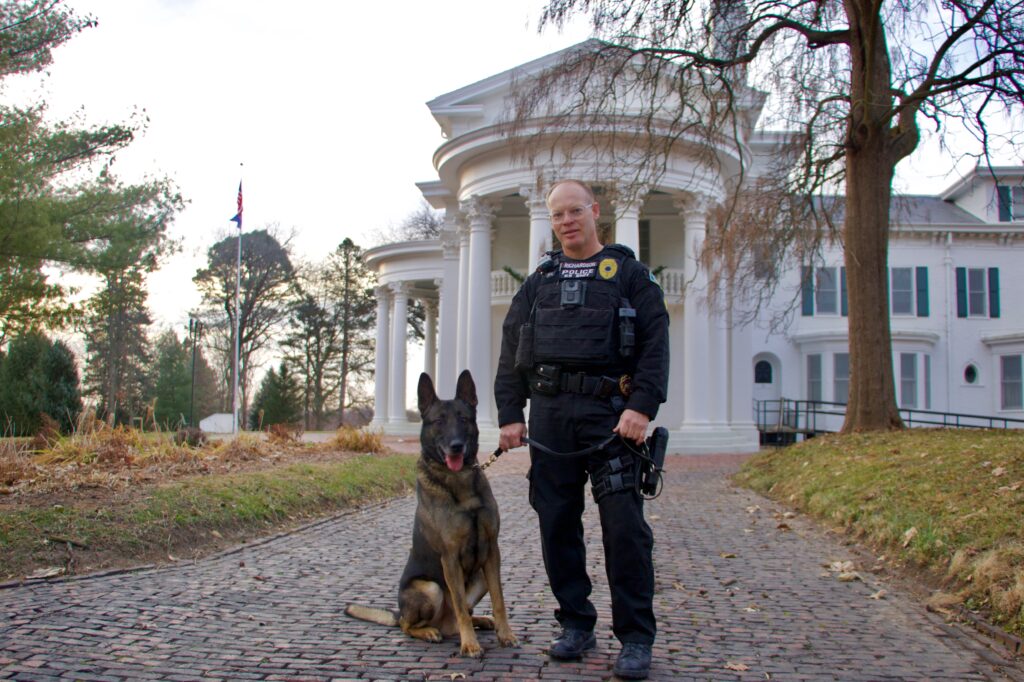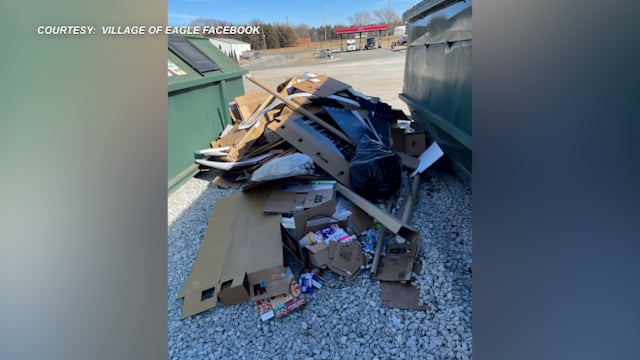Lawmakers to debate authorizing EMS care, transportation for injured Nebraska K-9s
Nebraska City police sergeant has been leading the charge on the legislation. At least 14 other states already have similar laws.

LINCOLN, Neb. (Nebraska Examiner, Zach Wendling) – State lawmakers are set to debate a measure Tuesday that would allow emergency medical services to provide care and transportation for Nebraska K-9s injured in the line of duty.
Sgt. Christopher Richardson of Nebraska City, after looking at other state laws, drafted and took the proposal to State Sen. Julie Slama of Dunbar, whose district includes Nebraska City. After they worked together on the proposal, he took the idea to State Sen. Merv Riepe of Ralston, a Health and Human Services Committee member, who introduced Legislative Bill 910 this year.
LB 910 would allow an emergency care provider to care for an injured K-9 and transport it to a veterinary clinic or similar facility. Currently, state law currently forbids any type of emergency care to be provided for an animal, including bandaging a minor cut.
“It’s going to help them,” Richardson said Monday of Nebraska’s law enforcement K-9s. “That’s no doubt.”
‘Very common-sense thing’
Richardson said trauma care for dogs is the same for humans in the field, but under current law, an injured K-9 is simply placed in the back of the handler’s vehicle and driven through traffic to a veterinarian. He said delaying medical care is leading to deaths.
In Nebraska City, Richardson said, it’s a delay of 45 minutes to the nearest applicable facility should his K-9 be harmed.
“These dogs are alone and untreated, wasting valuable time and preventing lifesaving measures from being performed,” Richardson testified at the bill’s Feb. 1 hearing.
This week, LB 910 is on the Legislature’s “Consent Calendar,” a procedural step that streamlines noncontroversial legislation for a vote after a maximum of 15 minutes of debate.
Under the measure, priority would still be given to humans in need of medical care or transport, and K-9 care or transportation is not mandated, Riepe said. The legislation provides civil and criminal liability for EMS workers operating in “good faith” in caring for the dogs.
“We just want to make sure we don’t leave a dog that was injured in duty behind, which seems like a very common-sense thing,” Riepe told the Nebraska Examiner on Monday.
Riepe’s legislation would take effect July 1, 2025, to give the Nebraska Department of Health and Human Services time to issue associated rules and regulations.
K-9 ‘saved my life’
Covered K-9s would be those aiding in the detection of criminal activity, flammable materials or missing persons or aiding in enforcing laws, investigating fires or apprehending criminals. These dogs are those employed by:
- Any state or local law enforcement agency or fire department.
- The Nebraska Department of Correctional Services.
- The State Fire Marshal’s Office.
Richardson testified that he has worked in law enforcement for more than 24 years and serves as Nebraska City’s K-9 officer. He recently was certified with his second canine, Alex, after his first, K-9 Mack, retired last fall.
K-9 handlers spend more time one-on-one with their dogs than with their families, Richardson said, and K-9s are more than pets or servants. As illustrated in one of his calls with K-9 Mack, they can also save an officer’s life without hesitation.
“He didn’t know any different. He had no idea that he’d saved my life, and that creates another bond,” Richardson said.
“They’re not just another tool that’s on our duty belt,” he continued. “They’re living, breathing — I have conversations with them — they don’t really talk back much but it’s funny because I talk to my dogs and it’s like they almost look like they understand me back there. I tell them to do something, and they do it.”
‘They are worth the investment’
In the past decade, 259 canines nationally died in the line of duty — 79 from gunshot fire, Richardson testified. More have died or been injured in the months since, he added Monday.
K-9s are major investments for law-enforcement agencies, ranging from $10,000 to $25,000 per dog, Richardson said. That is before agency time and resources are spent, which can total $40,000 or more.
In Nebraska City, Richardson’s K-9s are 100% funded through donations. He said his second K-9, who came to the United States from the Czech Republic, cost about $18,000 in travel and other initial costs from the time Richardson picked him up at the airport to when he got the dog home to his kennel.
“These dogs are valuable, and they are worth the investment, and they deserve LB 910,” Richardson testified.
Ten states allow EMS personnel to treat and transport injured K-9s, while four others allow just EMS treatment. Richardson said he’s hopeful Nebraska’s bill can be a “spark” for more states to act.
Slama said in a text she is grateful for Richardson’s service and leadership on the issue.
Rare but valuable care
At the bill’s hearing, Zachary West of Ravenna, who was training for his EMT license at the time, testified he was concerned that LB 910 could negatively impact rural resources. West was also worried about spending time away from family on patients he wasn’t trained to care for.
Richardson said he has served in volunteer departments for decades, which is all about service. Caring for a K-9, he said, would hopefully be a “once-in-a-lifetime” commitment, and he re-emphasized that based on his training, canine and human trauma care is identical.
Unless a handler is incapacitated, Richardson added, they would be assisting with their dog’s care.
Should lawmakers pass LB 910, it would be “huge” for Nebraska, Richardson said, similar to wearing a seat belt that you “hope you never have to use,” but it’s there when needed.
“We don’t want to have to transport our dogs in an ambulance,” Richardson said. “But if it comes to that, having that ability is huge.”



